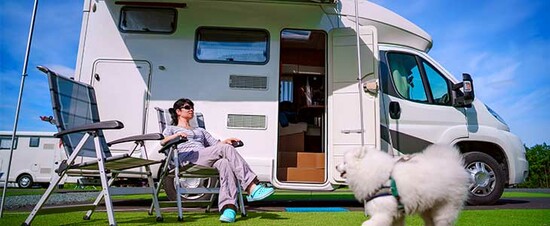When it comes to buying a second-hand motorhome, there are many benefits associated with purchasing through a specialist dealer. They understand the needs of each individual customer and can provide helpful advice on what type of vehicle is best suited to their requirements. Additionally, they often offer better deals than private sellers as they have access to more competitive financing options and discounts. Furthermore, these dealers will often include long-term warranties on their products as an assurance that buyers are getting quality for their money.
Motorhome Type
It’s easy to get carried away by the glamour and sudden popularity of motorhomes, so it’s important to take a step back and decide on the exact body type and motorhome layout that best suits your needs. Coachbuilt models provide a luxurious interior with plenty of space, while A-class models offer similar features in a sleeker package. Van conversions are also available for those looking for something smaller with basic camping facilities, although they don’t typically include full bathrooms. If you want extra luxury or more space, American coach-built or A-class models are available with bigger interiors and upgraded features such as king-size beds and multiple slideouts.
Depending on the make and model, these larger motorhomes can come with other amenities such as LED televisions, air conditioning units, full kitchens, private washrooms and showers, high-end finishes like hardwood floors or granite countertops, as well as outdoor entertainment systems such as an outside kitchen or patio awning. Of course, all these extras come at a price – but if you’re after something truly luxurious then it might be worth considering one of these higher-end models. Whatever option you choose, it is important to research different types of motorhomes carefully before making any decisions so that you have the best chance of finding one that fits your budget and meets all your needs.
Consider Your Budget
Spending as little as you can on your first motorhome is wise advice, and it’s important to remember that you should always hold back a portion of your budget. Not only will this give you some financial wiggle room in the event that any unexpected expenses arise, but it will also leave enough funds to buy any additional accessories or upgrades that you may feel are necessary in order to make the most out of your motorhome experience.
Most motorhome dealers have dedicated accessory shops where you can purchase all sorts of items for your vehicle, from gadgets and gizmos to safety features and extra storage solutions. These shops typically offer an extensive range of products at competitive prices, so it pays to have a look around before making a decision on which items best suit your needs.
In addition to shopping at a local dealership for accessories, it’s also possible to buy them online. This way, you can compare prices across multiple retailers and get the best deal possible. Of course, when purchasing online there is always the risk of receiving goods that don't meet expectations. To avoid such situations, be sure to read customer reviews before making any purchases and take into account shipping times when estimating total costs.
When buying motorhome accessories, it’s important to consider both the practicality and aesthetics of any items you are interested in adding to your vehicle. For example, choosing something like an outdoor kitchen might be attractive but if you plan on using your motorhome for camping trips then such an item may not be necessary or even feasible given the potential weight limitations imposed by a smaller vehicle. Similarly, opting for lightweight materials over bulky ones could help free up additional space inside the cabin while still providing added functionality outside.
Overall, considering your budget is key when it comes to shopping for motorhome accessories – and taking some extra time to research different options can really pay off in terms of finding high-quality items at affordable prices. With careful planning and consideration of all factors involved in buying extras for a motorhome – including practicality vs aesthetics – it's possible to find suitable accessories without breaking the bank!
Do Your Research
Researching the purchase of a motorhome can be an exhaustive process, but one worth spending time on to ensure you end up with a vehicle that meets your needs and expectations. It's important to read specialist publications and online reviews, as well as talk to owners who can provide an informed opinion of their experiences. Additionally, attending motorhome shows is another great way to learn about the different types, styles and layouts available.
It's not unusual for people to wait for years before taking the plunge and buying a motorhome - this is especially true if you're new to motorhomes and don't have much experience in the field. When it comes to research, it also helps to be aware of comments which may only reflect either really good or really bad experiences - any comments that fall outside these two ends of the spectrum should be taken with a pinch of salt.
For those uncertain, whether they want to commit fully to buying a motorhome, there are always options available such as renting one for a week or two before making a decision. This eliminates any potential buyer's remorse and gives you firsthand experience of what it would be like owning your own vehicle, helping you make an educated choice that best suits your lifestyle. Plus, many rental companies also offer special rates when renting for longer periods of time so even if you're looking at taking multiple trips before purchasing your own, you can still save money in the long run by opting for a rental first.
Motorhome Equipment
Today’s motorhomes come with all the facilities you’d expect in your own home, but with the added bonus of being able to travel anywhere at a moment’s notice. So, when choosing which motorhome is right for you, it is best to create a checklist of all the items and features that you need, want, and don’t want. Heating should be one of the primary considerations – does the model have blown air, radiator heat or both?
Hot water will be necessary for cooking and showering so ensure there are facilities for this; cooking facilities such as an oven and hob should also be considered. Refrigerator/freezer capacity is important too; if you plan on travelling around then you need to think about how much food storage space is available as well as overall storage (what kind of items do you want to carry during your travels?).
Additionally, aftermarket extras such as bike racks, awnings, solar panels and sat-nav systems can be added at a later date if necessary. Furthermore, modern motorhomes often feature reversing cameras and satellite TV receiving equipment which can really add to your experience whilst out on the open road. Ultimately, spending time considering every aspect of your prospective motorhome will help ensure it meets your needs while on holiday.


Comments
There are no comments yet. Login or Register and write an article comment